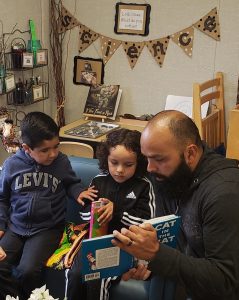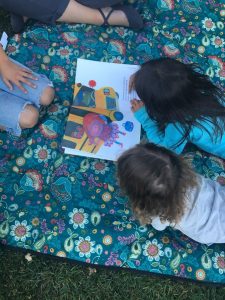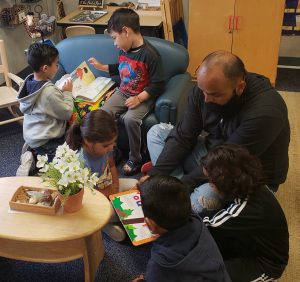As an Early Childhood professional, and as the Raising A Reader Coordinator for San Luis Obispo County, I understand the importance of teamwork in the educational field. Parents, teachers, administrators, and volunteer community members need to work collectively toward building a strong foundation for our young children who are truly the heart and hope of our County.
 Constructing strong, sustainable foundations for young children can be accomplished in many ways, and one of the most important is simply taking time to read stories out loud to them. Finding rich language in picture books is not unusual and reading these stories aloud will introduce children to an extensive vocabulary.
Constructing strong, sustainable foundations for young children can be accomplished in many ways, and one of the most important is simply taking time to read stories out loud to them. Finding rich language in picture books is not unusual and reading these stories aloud will introduce children to an extensive vocabulary.
Dominic Massaro, University Professor at Santa Cruz, who studies language acquisition and literacy, found that picture books are two to three times as likely as parent-child conversations to include a word that isn’t among the 5,000 most common English words. “Given the fact that word mastery in adulthood is correlated with early acquisition of words, shared picture book reading offers a potentially powerful strategy to prepare children for competent literacy skills in later school experiences.”
According to the Raising A Reader Organization, a baby is born with about 80 billion brain cells. About 700 connections each second are made between these cells in the first three years. How adults talk and how often they read to young children impacts their vocabulary growth and future learning.
 Again, reading picture books aloud enhances the learning of all children most especially many from low-income situations. By 18 months, many children in families with low-incomes begin to fall behind their peers in vocabulary development. Between the ages of three and five, on average, children in families with low incomes have heard less language and up to 30 million fewer words than their middle class and affluent peers. This can profoundly inhibit their learning abilities in elementary and high school.
Again, reading picture books aloud enhances the learning of all children most especially many from low-income situations. By 18 months, many children in families with low-incomes begin to fall behind their peers in vocabulary development. Between the ages of three and five, on average, children in families with low incomes have heard less language and up to 30 million fewer words than their middle class and affluent peers. This can profoundly inhibit their learning abilities in elementary and high school.
My hope is that our collective efforts can defy these statistics for children from low-income situations and in fact, be of help to all young children in our community. If you are a parent, teacher, teen, administrator, or just someone who loves books, read to our young children! “The stronger their language skills are when they reach kindergarten, the more prepared they are to be able to read,” says Brown University Professor, Pamela High. “The better they (children) read, the more likely they will graduate from high school. From there, they’ll be more likely to achieve higher education, enjoy positive familial relationships, and attain economic security.”
 In closing I ask you to remember that some of our young children are living in homeless shelters. I invite you to be part of their foundational development. Feel free to contact Alejandra Martinez (amartinez@slocoe.org) or me (spimentel@slocoe.org) to view the volunteer calendars and to sign up as a guest reader. We have partnered with the ECHO Shelter in Atascadero and the 40 Prado Shelter in San Luis Obispo, reading to children for 30-minute story times. Speaking as someone who has read books to the amazing young children residing at the ECHO Shelter, you will find it very rewarding.
In closing I ask you to remember that some of our young children are living in homeless shelters. I invite you to be part of their foundational development. Feel free to contact Alejandra Martinez (amartinez@slocoe.org) or me (spimentel@slocoe.org) to view the volunteer calendars and to sign up as a guest reader. We have partnered with the ECHO Shelter in Atascadero and the 40 Prado Shelter in San Luis Obispo, reading to children for 30-minute story times. Speaking as someone who has read books to the amazing young children residing at the ECHO Shelter, you will find it very rewarding.
Shannon Pimentel
Program Supervisor, First 5
San Luis Obispo County Office of Education
spimentel@slocoe.org
805-481-5842